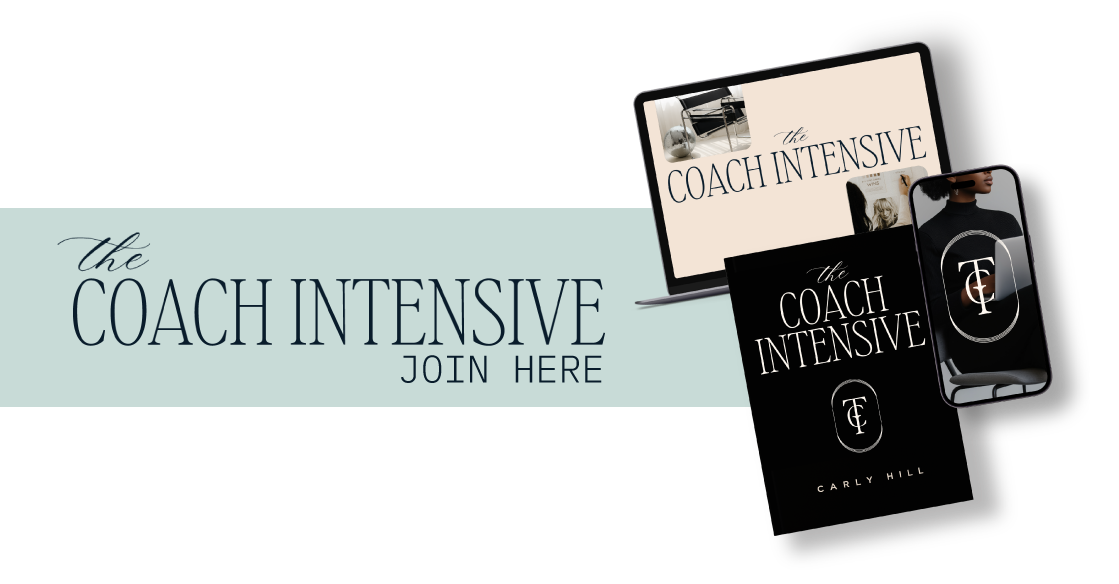Build a Life-Changing,
Money-Making Coaching Business
With Proven Strategy, Smart Systems & Unmatched Support
For innovators, trailblazers, and leaders who know you’re meant for more.
Because growing a life-changing coaching business isn’t about hustling harder. It’s about building smarter.
AS FEATURED IN


CARLY HILL
LCSW, certified Coach, 7-figure business mentor
AS FEATURED IN
You’re Here For
More FREEDOM, more MONEY, more IMPACT
LESS time on the clock…
LESS self-doubt…
LESS wondering if you’ll ever get to live the life you’ve been helping everyone else create…
You’re not crazy for wanting it all.



Here’s HOW to Make the TRANSITION
Free Quiz
What’s your next step on the path to a thriving coaching practice?

Whether you’re still daydreaming about coaching, or crushing it as a coach and ready to scale, this assessment will:
Pinpoint exactly where you are on your journey to a 6-7 figure coaching business.
Pull off the blinders so you can see exactly what’s been keeping you stuck.
Give you a precise plan of action based on your goals, your season of business, and your biggest roadblocks
Free Guide
3x Your Income While Working LESS

400+ therapists, wellness pros, and coaches have used this framework to create stability, financial security, and flexibility. Inside, you’ll learn:
The exact process for turning your expertise into a coaching offer that changes lives and 2-3xs your income
How to identify your perfect-fit client—and attract people who happily pay premium rates to work with you
A simple marketing plan, so you never have to wonder where your next client is coming from
Go From Maxed Out, Plateaued, or Unsure Where to Go From Here… To Scaling, Systemized, & Soaring Towards MILLIONAIRE STATUS…
…In 4 Months or Less.
BOOK a free 45-Minute Strategy Call With Team Carly
HI! I'm CARLY HILL
Who Am I, and What Do I Know About Building a Coaching Business?
I’m Carly Hill—a mentor for therapists, wellness pros, and coaches who want to build businesses that support their dream lives (instead of consuming them).
Today, I’m known as a no-BS business coach, best-selling author, host of The Thriving Therapreneur Podcast, and founder of a multi–7-figure coaching business.
But before the accolades and the success, I was a burned-out community mental health social worker turned private practice therapist who desperately wanted more.

I loved my clients and loved doing work that mattered. But…
My income was capped. I can’t even tell you how many hours I logged doing 1:1 work for $18-150/hour.
I started scaling my practice and STILL couldn’t reach the level of income I wanted.
My calendar was overflowing. Even as a “practice owner,” I could barely find the time to take an afternoon off, much less a real vacation.
I looked successful… but inside, I was suffocating
Far too often, I stared out my office window and wondered… Was this really it for my life? I knew I was meant for more. If you’re reading this, you probably know that feeling too. You might be asking yourself...
“There’s gotta be SOMETHING BIGGER for me…right??”

There is. Stay with me here.
What changed my life (and my income) was learning how to stop thinking like an overworked provider… and start thinking like a coach, CEO, and visionary.
I bootstrapped my coaching business from the ground up. Since then, I’ve:
Scaled to multiple 7-figures while working fewer hours each year (including earning half a million while on maternity leave!)
Helped over 400 experts (and counting) turn their expertise and passion into a profitable, purpose-led coaching businesses
Developed powerful, easy-to-implement strategic frameworks that spread like wildfire through the industry
Built systems that collapse your growth timeline without sacrificing integrity
Leveraged AI to help ambitious coaches build even faster, with more flow and less force
I’m here to HELP YOU step into the lifestyle of freedom and impact you know YOU'RE MEANT FOR—no guessing, late-night spiraling, or hustling required.
Want to Work With Me?
BOOK a free 45-Minute Strategy Call With Team Carly
IS THIS WORK forYOU?
Therapists
You’ve got big dreams and an even bigger heart. I see you, because I AM you! You’re ready to expand beyond the 1:1 model—ethically, legally, profitably. You want income that reflects your expertise (without burning out). And you want to do deeply meaningful work that changes lives… and to get PAID what that kind of work is really worth.
Health & Wellness Pros
Your work is life-changing. Your clients love you, and you know you’re working in alignment with your purpose. But you’re DONE trading time for dollars. You crave freedom. You dream of a version of your business that works for you, even when you’re not in the room.
Coaches
You’ve got the spark, the skill, and the track record. You’ve already built something good—but you know it could be undeniable.
You’re done playing small, and you're ready to rise. You want high-level systems, next-level strategy, and mentorship that can take you to multiple 6 figures, your first million, and beyond. You’re not here to guess anymore. You’re here to lead.
Sound Like You? Here’s How I Can Help…

The Coach Intensive
My signature program for experts who are ready for MORE.
The Coach Intensive gives you:
Proven business strategies that meet you where you are
Unlimited 1:1 coaching so you can move fast
Custom AI Assistants that take the heavy lifting off your plate
The complete system to build and scale your coaching program
Carly-AI
Imagine having a 7-figure Dream Team in your pocket 24/7.
Skip the learning curve and build faster with custom AI assistants trained on the exact campaigns and frameworks behind my multi–7-figure business.

Getting Started
Not sure where to begin?
have a whole library of free and low-cost resources to help you:
Start coaching ethically, legally, and confidently
Create or refine your first (or next) coaching offer
Fill your programs with clients who can pay what your work is worth
You DON'T HAVE to Choose Between Doing MEANINGFUL Work & Doing Work That Pays You WHAT YOU DESERVE
...because success that costs you your peace ISN'T success at all.
This is where strategy meets soul, and where your next level begins.
Give me 4 months, and I’ll help you build a coaching business that:
Triples your annual income
Expands your impact
Returns time, space, and flexibility to your schedule
Gives you autonomy and freedom you’ve never had before
Your First Step
Book a FREE 45-Minute Strategy Call
Here, you’ll meet one of my wing women for a no-pressure, no-cost consultation.
Here’s what you can expect:
ANSWERS to all your questions. We’re open books here. Seriously, ask us ANYTHING and my team will be happy to share.
DIRECTION about your niche, your overall business strategy, and the missing pieces that are keeping you stuck with capped income, inconsistent revenue, and feeling like you can’t move forward.
CLARITY as to whether mentorship is right for you right now, whether I’m the right coach for you, and (if all signs point to yes) which of my programs is the best fit.

If you chat with my team and realize this isn’t for you or now isn’t the right time to move forward, no biggie.
If the call leaves you feeling fired up, clearer than ever, and ready to move forward—then we partner and rise. ❤️🔥
BOOK a free 45-Minute Strategy Call

































